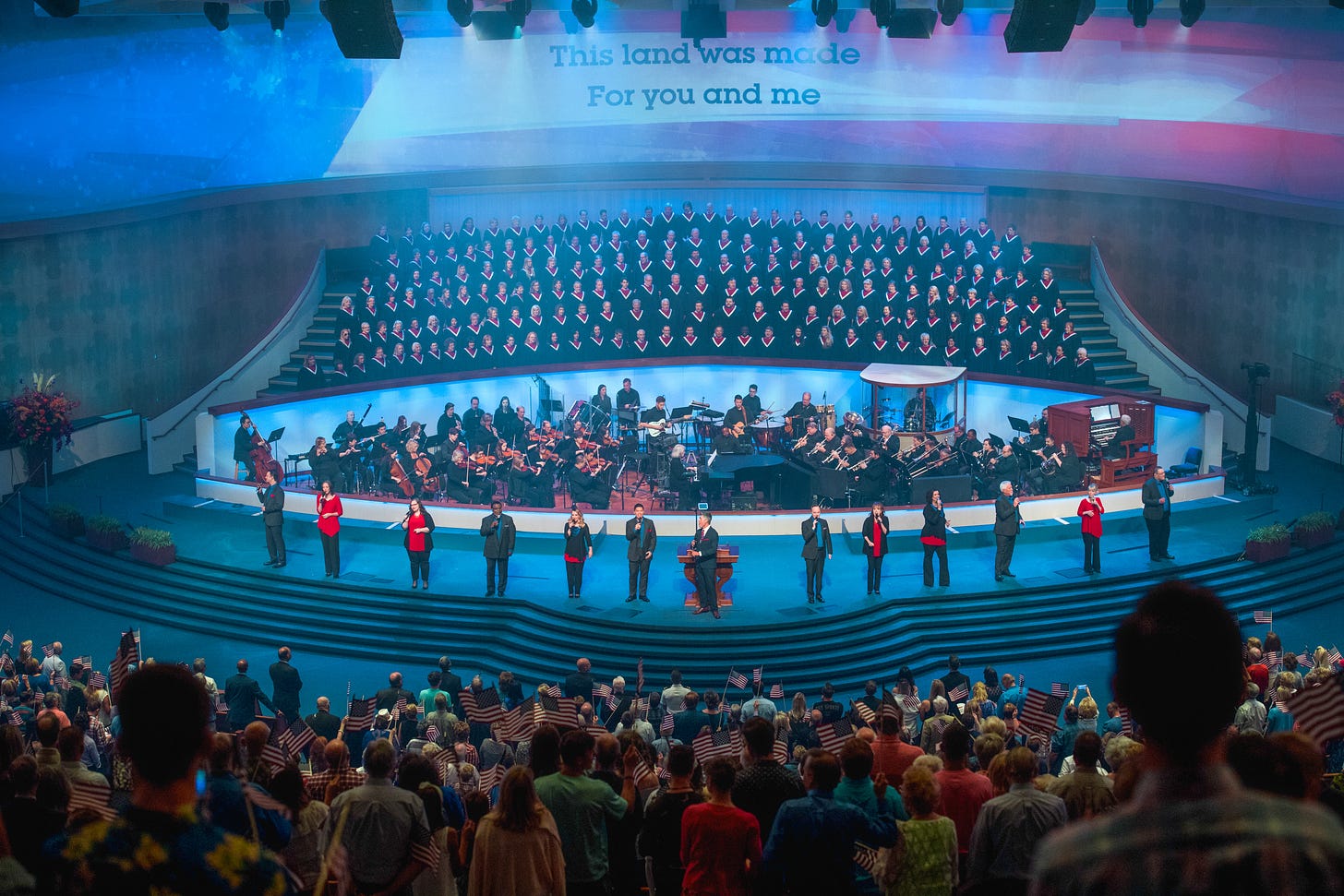Every year round July 4th thousands of Christian congregations hold "Celebrate America" or "God & Country" services.1 These celebrations usually include various patriotic tunes like “God Bless America,” “America the Beautiful,” “God Bless the U.S.A.,” and various anthems of the United States military. Such services are one of the items I include in my "Field Guide to Christian Nationalism" in American Idolatry.
Red, white, and blue are featured everywhere, and a theme of triumphant gratitude pervades the proceedings. A sermon or homily usually directly links the greatness of the United States to the blessing of the Christian God.
Appreciation for the nation and people we were born into is not Christian nationalism by default. That said, these services sometimes veer into exalting the United States over and above every other nation and people.
However, a certainty about God’s stake in the ultimate triumph of the United States should give us pause. Of course, some congregations are more careful than others in how they acknowledge the founding of the United States. For instance, one service I attended a few years ago did not shy away from acknowledging the history of racial inequality in the United States.
Nevertheless, a big “Celebrate America” service should prompt questions and careful thinking about the assumptions made concerning the relationship between the United States, its history, its military, and Christianity.2
At one service I attended the MC declared, "God has ALWAYS been on our side." This form of certainty of the divine chosen-ness of the United States, and that ALL our military endeavors are blessed by the Christian God, is clearly dangerous.
While acknowledging the many dangers with devoting an entire worship service to celebrating the United States and our certainty of God’s blessing, there are aspects of our country worth celebrating.
So can we be Christians and patriotic without veering into Christian nationalism?
Yes! You can be a Christian and patriotic.3 Christians can be grateful to the US for all the opportunities and privileges it provides. We can celebrate the good that exists in this country. We can honor the people and moments in this country’s history that moved us toward a more just and kind world.
We can oppose Christian nationalism and express “affection and loyalty to a specific part of God’s creation” that encourages us to “do the good work of cultivating and improving the part we happen to live in.”
Being a patriot, though, does not mean Christians should ignore the difficult and at times heinous aspects of our collective history. We cannot truly love something if we are unwilling to tell the truth about it. I appreciate how Kat Armas says it: “We cannot belong to one another if we’re not committed to telling the truth about ourselves and each other. Injustice affects both the oppressor and the oppressed, so we must tell the truth about the past . . . [to] heal our future.”4
I’m not alone or the first one to say it: being a patriot means we tell the truth about our nation’s history & work toward a future in which everyone is able to participate. Doing so “reveals artificial stories for what they are and creates space for truer ones.”5
We can then fulfill the unrealized aspirations of the founding period, creating a space where all are able to enjoy life, liberty, and the pursuit of happiness. Christians can and should wholeheartedly endorse this project. Only when we recognize the kingdom of God as superior to the nation can we speak truth to power and maintain a prophetic stance advocating for those on the margins.
When we consider ourselves part of the kingdom of God, we can acknowledge that politics and power in this world can be leveraged for the benefit of all, not just those most like us.
We can commit to demanding that the hurting, the sick, and the powerless live without fear of violence, receive healing care for their wounds, and be able to exert influence on our communities and nation as bearers of the image of God. Advocating for the rights of our neighbors is the work of Christians.
That sounds like patriotism to me.
First Baptist Dallas has one of these services every year.
See American Idolatry page 40 for more.
The section draws from American Idolatry pages 47-48.
See Kat Armas’ wonderful book, Abuelita Faith: What Women on the Margins Teach Us about Wisdom, page 72.
See Kaitlyn Schiess’ excellent book, The Liturgy of Politics: Spiritual Formation for the Sake of Our Neighbor, page 166.





I’m sure FBCDallas omitted these words -
“As I went walking I saw a sign there,
And on the sign it said "No Trespassing."
But on the other side it didn't say nothing.
That side was made for you and me.
In the shadow of the steeple I saw my people,
By the relief office I seen my people;
As they stood there hungry, I stood there asking
Is this land made for you and me?”
Thank you. 🕊️